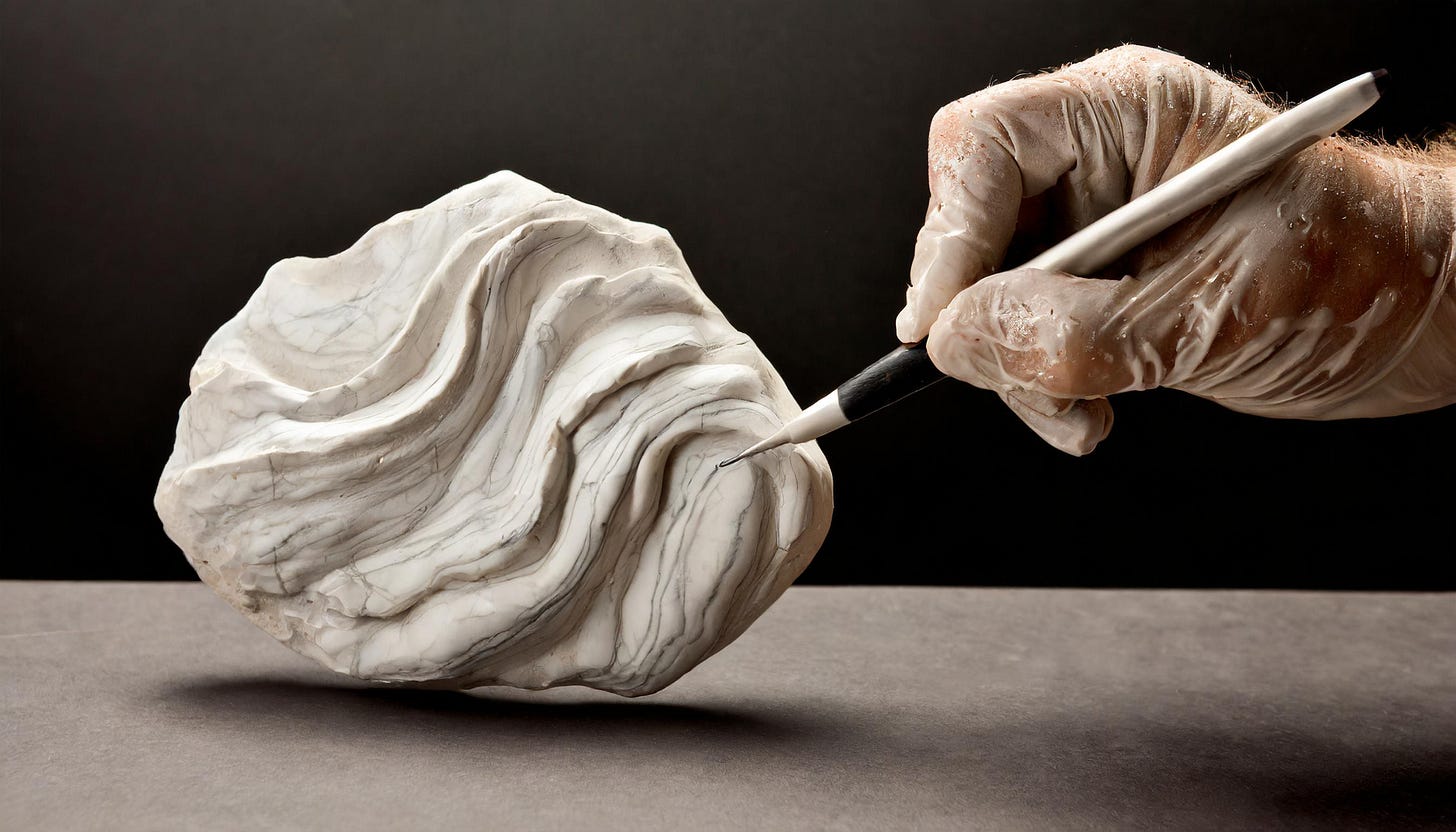To be honest, the parallel may not be that original. Little is these days - though oddly (and here’s a tangental thought) - Artificial Intelligence may be where we see the greatest volume of ‘originality’ in the future… But that’s a topic for another day.
Back to writing and sculpting; let’s see where that takes us.
Step-by-step, the parallels are striking.
Each begins with what we might term ‘an unformed block’ - of marble or wood, say; or the large unstructured dictionary of words we keep in our heads.
Usually we also start with an idea: I want to create a figure, an abstract, something in the form or a fruit; or I’d like to write about this person, that emotion, this experience. Having a fully-formed idea isn’t obligatory of course; often we can just ‘go with the flow’ and see where the marble / wood / words take us.
Then we start work on our ‘draft’. This is where the marble / wood begins to take the form we are searching for, or the words start to tell the story we want to share (and it could be a poem or play too, obviously).
Having completed our draft - or even part-way through it - is when we stand back and decide if it’s worth pursuing.
Assuming it is, then we carry on. We refine details, add subtlety to the shape, edit the words. And then we repeat steps 4 & 5 until we’re happy with what we’ve produced - or decide that it’s a failure! Repetition / refinement is vital.
In the end - if we’re lucky - we arrive at something we’re proud of and are happy to share. And most often the sharing is achieved through someone else viewing / reading - or even holding, if we’re talking about a sculpture / a physical book.
At this point you might object and say that the above applies equally to painting or making a movie, and you’d be right. Surely the intrinsic creative process is pretty much the same: take one thing or things, and turn it or them into something else. Words, materials, tubes of paint, actors etc.
Thanks to technology, with words, if you accidentally chip the metaphorical nose off your metaphorical figure, you can usually put it back!
Other than stating the obvious, what take-aways might there be in this parallel for writers? I can think if several, at least one for each of the steps above:
Given our source material is an unstructured dictionary in our heads, what we might choose to do with that offers us infinite potential and possibility. It is a well which can never run dry. Only illness (or death) will deny us access to the how.
Similarly, the things about which we might choose to write - the what - are limitless. Taking this as a given - along with the myriad possibilities of how we might choose to depict the what - then we have no excuse not to find something to write about. I simply do not believe that ‘Writer’s Block’ is ‘a thing’.
Because this stage is all about drafting, giving that initial form and shape, we should reconcile ourselves to the notion that it can never be finished ‘right first time’ unless we have been anointed with the genius - and I suspect in the 21st Century ‘genius’ is an outdated concept, a myth. Either that or a word bandied around far too liberally in relation to the merely above-average.
Is about belief. Do we honestly believe in what we are working on. This is my issue with ‘the French story’ (where, on this site, I’ve started to share the outputs from step 3). I simply don’t know if I do.
More and more, this is where I think a writer’s real work happens. Or a real writer’s work happens. (The power in swapping words around!) The joy of editing; of attempting to get that nose just right - and when we knock it off, going back and trying again! People decry editing; lots of writers hate doing it. I was at a public event last week when someone chose to read out loud (on stage, to an audience) a poem they’d written in the car about an hour beforehand… Really?! In my book, that’s going from steps 1 & 2 straight to 6; it’s refusing to accept the full responsibility of ‘being a writer’.
Is where the joy is - hopefully. It’s the why we put ourselves through the agony. It is reaching number 6 which makes us want to go back to step 1 and start all over again.
And the point of all this? Maybe to try and get something straight in my own mind. And maybe to suggest that you might want to think about our own process in these terms: ask yourself if your writer’s block is a valid and real thing; consider whether you’re committed enough to your craft to pursue steps 4 & 5 until you’ve produced the best material you can - or recognise that you tend to gallop through to step 6 and risk letting yourself down in the process.
And maybe it’s about affirmation: of all the things we could write about and how we might do so; the joy of the fight; the agony and the ecstasy…





I see a similarity with sculpture but really isn't it the case that the more time you spend on writing ( even rubbish) the better you will get. I go to open mics and am always surprised at the number of people who will read out a poem they've just composed. Some are really good ( particularly rap) but others less so but they do love the buzz of performing.